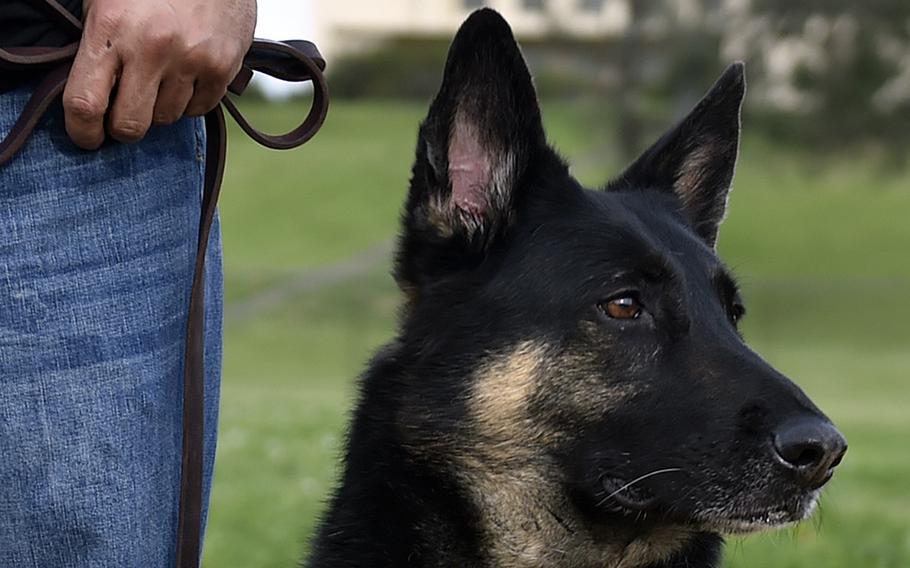
The Service Dogs Assisting Veterans Act, also known as SAVES Act, is a bipartisan, bicameral legislation would establish a five-year, $50 million VA-administered grant program for eligible nonprofit organizations dedicated to providing service dogs to veterans. This includes individuals with disabilities like PTSD and traumatic brain injury. (Liliana Moreno/U.S. Air Force)
As a combat veteran and a member of the House Veterans’ Affairs Committee, I have witnessed firsthand the epidemic of suicide and its devastating impact on the veteran community. Too often I have heard of a fellow brother or sister in arms losing their battle with mental health.
This is a deeply personal issue to me. In Congress, it is my priority to represent the silent voices of those who are suffering alone. No veteran should have to face this battle by themselves; it is our duty to serve those who sacrificed everything for this country.
An estimated 17 veterans die each day by suicide — this is 17 too many. Our mission must be to eradicate suicide within the veteran community; anything less is unacceptable. These tragedies leave families devastated — mothers and fathers burying sons or daughters, spouses losing their partners, children growing up without parents, and a nation mourning. No one should have to endure such pain or ever be asked to carry that burden for the rest of their lives. Addressing the suicide epidemic must be everyone’s top priority. We owe it not only to our veterans but also to their families and loved ones. This is a battle we are losing every day, and it is a fight we cannot afford to lose.
While veterans make up just 8.2% of the population, they account for nearly 14% of all suicides nationally. In 2024, the Department of Veterans Affairs published its annual National Veteran Suicide Prevention report, revealing that in 2022, there were 6,407 veteran suicides. Suicide was the second leading cause of death among veterans under 45, with the highest rates occurring among those aged 18 to 34. The report also highlighted that 50.4% of veterans who died by suicide in 2022 had utilized Veterans Health Administration or Veterans Benefits Administration services in 2021 or 2022, while 49.6% had not. Between 2020 and 2022, data from the VA Behavioral Health Autopsy Program showed that the leading factors contributing to veteran suicides reported to VHA Suicide Prevention teams were pain (53.8%), sleep issues (51.4%), health problems (42.5%), declines in physical ability (34.3%), relationship difficulties (33.1%), and feelings of hopelessness (30.4%).
The unique stresses of military services such as combat, high-risk environments, separation from family, and trauma can have lasting effects on veterans’ mental health. Issues like post-traumatic stress disorder, depression, anxiety, and substance abuse often emerge years later, impacting their well-being long after service. The transition from military service to civilian life and a veteran’s reintegration into society can ultimately exacerbate these issues, due to the loss of identity, and a lack of support systems.
Often the veteran chooses to deal with these issues alone, out of fear of the stigma that surrounds mental health. We must break that stigma around suicide, expand nontraditional prevention methods, foster public-private collaboration, and accelerate investment in promising research.
As we look to address this dire issue facing our veteran community, I am reintroducing the Service Dogs Assisting Veterans Act, also known as SAVES Act. This bipartisan, bicameral legislation would establish a five-year, $50 million VA-administered grant program for eligible nonprofit organizations dedicated to providing service dogs to veterans. This includes individuals with disabilities like PTSD and traumatic brain injury.
Funding is critical, as training a single service dog costs over $50,000 on average. With thousands of veterans on waitlists for these organizations, this would expedite the process, allowing for veterans to receive the support they need and that might just save their life. Mental health is not a one-size-fits-all approach, but this legislation will take an important step forward in addressing the different needs of our veterans.
It’s vital we provide a wide array of tools to treat their mental health issues. Simply put, veterans and active military personnel with PTSD, TBI, military sexual trauma, suicidal ideation, and other mental health challenges cannot keep waiting. For them, the SAVES Act grant program could mean the difference between life and death.
As a congressman and fellow veteran, it is my duty to stand up for those who served. We must confront this crisis head-on — our service members deserve the best from the nation they sacrificed so much to protect. For too long, we have lost countless veterans to this epidemic. It’s time to honor those who gave everything by taking real action.
Rep. Morgan Luttrell, a Republican, represents Texas’ 8th District in the U.S. House of Representatives. He is a Navy combat veteran who serves as chairman of the Disability Assistance and Memorial Affairs subcommittee on House Veterans’ Affairs Committee.